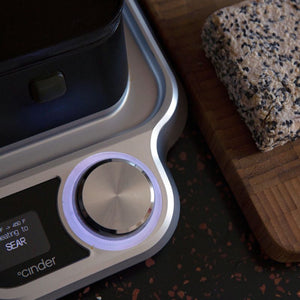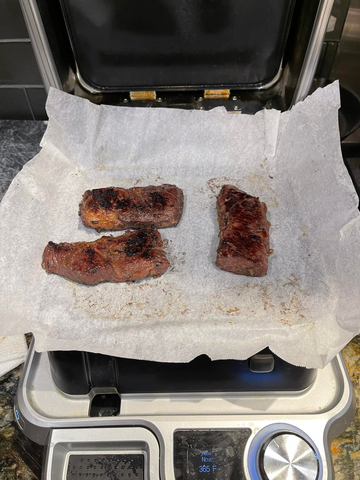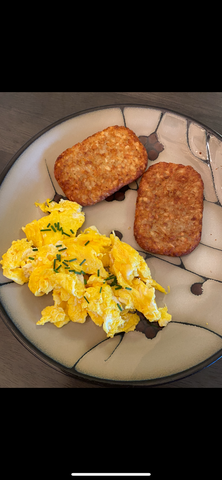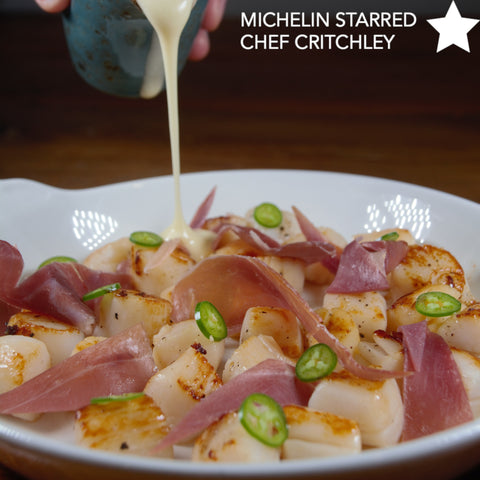
Food Guide
These Cinder Grill recommended temperatures match general sous vide temperature charts. Download Cinder App on iOS and Android for more recommended cook temperatures.
Overall Temperature Guide
Meats - Typically cooking in the range of 125° up to 160°F. The lower temperatures will be used to choose the doneness of the meat. At higher temperatures, or longer cooking times, there will be tenderizing effects. After reaching temperature and before searing, meat can typically be held for hours with no loss of quality. Meat is typically seared afterwards to create a flavorful crust.
Fish - Fish tends to be cooked to a lower temperature than meats between 104°F to 140°F. The hold time between reaching final temperature and searing is minutes rather than hours, maxing out around 20 or 30 minutes depending on the specific type of fish. Searing can be done skin-side only, or skipped completely for a poached texture.
Produce - Higher temperature near boiling is used to break down the cell walls and soften the food. 185° seems to be the magic number, and the cook time is on the order of 5 - 15 minutes. Higher temperatures can be used to caramelize the sugars (in fruits), try 280° - 330°.
Breads - The magic temperature is around 350° which is the smoke point of butter. Bread will brown evenly and yet not burn, so that food can be left unattended for 10 or 20 minutes.
Fats - Butter and oils have different smoking points. You can set Cinder just below the smoking point in order to make effective use of the oil.
Eggs - omelets or scrambled eggs respond well to 275°, care should be taken to avoid the drip tray by pouring slowly, allowing the egg time to solidify. If the top is closed, more moisture is retained for a fluffier result. Fried eggs can be cooked around 350°, closing may cause the upper cooking plate to contact the top of the yolk.
Beef
Picanha or Sirloin Cap or Rump Cap
Medium Rare: 131°F
Medium: 134-139°F
Rib Eye
Rare: 129°F
Medium Rare: 133°F
Medium: 136°F
Medium Well: 144°F
Well Done: 154°F
New York Strip
Rare: 129°F
Medium Rare: 133°F
Medium: 136°F
Medium Well: 144°F
Well Done: 154°F
Filet Mignon
Rare: 129°F
Medium Rare: 133°F
Medium: 136°F
Medium Well: 144°F
Well Done: 154°F
Porterhouse
Rare: 129°F
Medium Rare: 133°F
Medium: 136°F
Medium Well: 144°F
Well Done: 154°F
Flank Steak
Rare: 129°F
Medium Rare: 133°F
Medium: 136°F
Medium Well: 144°F
Well Done: 154°F
Top Sirloin
Rare: 129°F
Medium Rare: 133°F
Medium: 136°F
Medium Well: 144°F
Well Done: 154°F
T-Bone
Rare: 129°F
Medium Rare: 133°F
Medium: 136°F
Medium Well: 144°F
Well Done: 154°F
Tri-Tip
Rare: 129°F
Medium Rare: 133°F
Medium: 136°F
Medium Well: 144°F
Well Done: 154°F
Hamburger
Rare: 129°F
Medium Rare: 133°F
Medium: 136°F
Medium Well: 144°F
Well Done: 154°F
Short Rib
Set your Cinder device to 165°F for 6-9 hours. The longer short ribs are left, the more tender they become.
Other
Rare: 129°F
Medium Rare: 133°F
Medium: 136°F
Medium Well: 144°F
Well Done: 154°F
Pork
Bacon
Sear Mode at 450°F for 6-8 minutes
Pork Belly
165°F (Takes ~90 minutes)
Pork Chops
Rare: 136°F
Medium Rare: 140°F
Medium: 143°F
Well Done: 158°F
Tenderloin
Medium Rare: 130°F
Medium: 140°F
Medium Well: 150°F
Well Done: 160°F
Lamb
Leg of Lamb
Rare: 129°F
Medium Rare: 133°F
Medium: 136°F
Medium Well: 144°F
Well Done: 154°F
Lamb Loin Chops
Rare: 127°F
Medium Rare: 131°F
Medium: 136°F
Medium Well: 140°F
Well Done: 150°F
Poultry
Chicken - dark meat
Firm and Juicy: 150°F
Tender: 165°F
Chicken - light meat
Firm and Juicy: 150°F
Tender: 165°F
Duck
Rare: 129°F
Medium Rare: 133°F
Medium: 136°F
Medium Well: 144°F
Well Done: 154°F
Fish and Seafood
Salmon
Buttery soft: 104°F
Light flakes: 113°F
Flaky: 122°F
Very flaky: 131°F
Well done: 140°F
Scallops
Rare: 125°F
Medium: 131°F
Sea Bass
Tender and flaky: 132°F
Tuna (Steaks)
Seared tuna: Sear Mode at 450°F for 1 minute
Very moist: 110°F
Meaty and juicy: 115°F
Firm and dry: 120°F
Vegetables
Asparagus
400°F for 6-8 minutes
Broccolini / Broccoli
400°F for 6-8 minutes
Cauliflower (Steak)
187°F, then sear mode for 45+ seconds with butter
Eggplant/Aubergine
185°F, then sear for 45+ seconds
Fruit
Apples (Pie Filling)
170°F, for 10 minutes
Other (grilled sandwiches, breakfast)
Eggs - omelets or scrambled eggs respond well to 275°, care should be taken to avoid the drip tray by pouring slowly, allowing the egg time to solidify. If the top is closed, more moisture is retained for a fluffier result. Fried eggs can be cooked around 350°, closing may cause the upper cooking plate to contact the top of the yolk.
Fried Eggs
400°F for 3 minutes, with a splash of oil
Flip as desired for over easy, medium, hard
Quesadilla
Heat the Cinder to 400°F.
Fill half the tortilla with your filling leaving ~0.5 inch around the sides for cheese and toppings to fall out. Fold over the other half of your tortilla so you have a half moon.
When Cinder reaches 400°F, drizzle a little high smoke point oil on the bottom plate such as vegetable oil, avocado oil or canola oil.
Place the tortilla on your Cinder briefly then flip over to get oil on both sides. Close Cinder and leave for 1-2 minutes until crispy, golden brown, and the cheese has melted.
Pro tip: Toast the tortilla for 10 seconds in Cinder before adding the filling.
Scrambled Eggs
275°F for 5-10 minutes
French Toast
400°F for 90 seconds
Grilled Cheese
Set Cinder to 145°F, place your sandwich and wait until the sandwich is done. Remove the sandwich, turn your Cinder up to sear temperature (450°F). Drizzle a little oil then place the sandwich in Cinder, close the lid and press the dial to sear for 45 seconds.
Pro tip: add mayo to the outside of your sandwich for a perfect crisp.
Halloumi
Sear at 450°F for 45+ seconds
Parmesan Crisps or Fricos
375°F: Sprinkle a quarter of a cup of grated parmesan directly onto the grill in a thin, even circle. Leave the grill open. After 1 minute, when the cheese is fully melted and golden brown, switch off Cinder and leave to cool for an additional minute before removing the crisps with wooden tongs or a spoon.
Pancakes
400°F, three minutes on one side, two minutes on the other side
Tofu
145°F, then optional sear for 45 seconds on each side
Precision Temperature Cooking - This sous vide style cooking brings the entire food to a specific temperature. The food can be held until ready, and is often seared afterwards. Use the app to set up this kind of cooking and be notified when the temperature is reached.
Searing - High temperature searing for a minimal length of time means less heat reaches the center of your meat. This creates various flavor reactions such as Maillard browning, caramelization, and pyrolysis char. If you sear with oil, you'll get a deeper crust and more even sear as oil fills in the gaps at the surface of food and helps accelerate heat transfer. Use a high temperature oil with a smoke point above the searing temperature.
Cinder's searing function runs at 450°F and has a 45-second timer when the knob is pressed down. Crank the dial all the way up to maximum to start this mode.
Frying - If Cinder is placed on a flat surface, it is possible to pour enough cooking oil in the center to pan fry, for example battered dover sole. 350° is the magic temperature for frying with Cinder Grill. You can lower the top to reduce splatter.
Browning/Caramelizing - 275°F to 350°F can be used to set and forget vegetables. For example, sliced onions will brown, and brown more, but not burn, around 300°. Eggplant, brushed with olive oil, cooks well at higher temperatures.
Griddle - You can use Cinder Grill as a precision temperature griddle with a cooking surface at just the right temperature for you. This is great for frying eggs, cooking perfect pancakes. Check out our library of Cinder Grill recipes for more!


